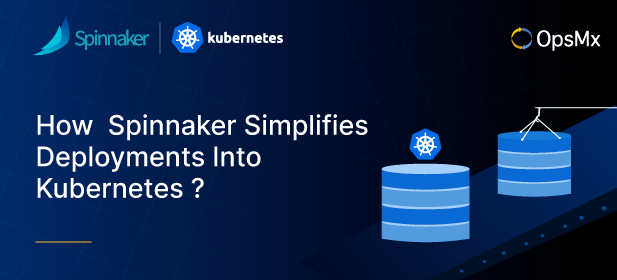What is Kubernetes?
Kubernetes is a container orchestration framework that was developed by Google to manage docker containers. Kubernetes helps to manage applications that are running on hundreds or thousands of container environments. It can also manage applications running in different environments, like physical machines, virtual machines, or even hybrid deployment environments.
Why Spinnaker for Kubernetes?
Though Kubernetes can manage all of your container requirements, it is not a deployment tool. The adoption of Kubernetes is happening at an incredible pace. The first step is to look for tooling to support continuous deployment workflows with Kubernetes.


Spinnaker is being rapidly adopted by companies in need of high scalability, easy and reliable multi-cloud deployments, and automated Continuous Delivery (CD) pipelines that free up their teams to do their best work. Spinnaker deploying into Kubernetes offers a better way to make deployment pipelines more flexible and also helps with visibility, configuration, and easier rollbacks.
How does Spinnaker work with Kubernetes?
Infrastructure management
Spinnaker provides oversight into infrastructure health. The granular insight can help site reliability engineers (SREs) track infrastructure that is running, stopped, or overloaded, as well asprovide insight into the health of the infrastructure.
Use”Kubectl on Spinnaker
Spinnaker resource management is similar to Kubernetes resource management, which makes them compatible.
Deployment Automation
Though Kubernetes has a deployment API, it lacks advanced features. Spinnaker is using the official Kubernetes API so it can do everything that Kubernetes can do on its own. Spinnaker fills in the gap by integrating a powerful automated deployment pipeline and allows DevOps and SREs to perform multiple deployment strategies, which are not natively provided on Kubernetes.
Why Spinnaker over Jenkins?
Most companies use Jenkins with a lot of scripts to perform deployments. Jenkins is a build tool and natively does not support deployments as it was centered to work with scripts and for ad-hoc executions. There are plug-ins that enable deployments but these add-ons are not scalable and cause issues while deploying to multiple clouds.
Jenkins has no visibility into the infrastructure, whereas Spinnaker offers first-class support of cloud resources.
Let’s review how Spinnaker can give Kubernetes a boost.
Ways Spinnaker can simplify deployments into Kubernetes?
Compatible resource mapping models
In simple terms, resource mapping is knowing the destination of the infrastructure/pods of where the pipeline is destined to deploy into. Both Spinnaker and Kubernetes work on similar models of resource mapping, which makes it easy for SREs to deploy into Kubernetes. Both are backwards compatible, anyone with knowledge of Kubernetes can instantly work on Spinnaker without the need for additional training, as Spinnaker can leverage “Kubectl” commands.
Amplified deployment capabilities
Kubernetes has its native deployment API, but it lacks advanced deployment capabilities and rollbacks. Performing a Blue-Green or a Canary deployment with rich data analysis is not possible. Spinnaker can easily fill in the gap by setting up fully automated pipelines that deploy into Kubernetes perform Machine Learning -based automated deployment analysis and support easy and automated rollbacks.
Spinnaker will additionally provide visibility into your Kubernetes pods so that engineers can check what’s running, what’s impacting traffic, and the health of a Kubernetess cluster.
Cloud-native
Most companies have extended Jenkins to perform deployments with the help of scripts. It must be noted that Jenkins is to be primarily used for ad hoc deployments and code builds. The script-based deployment can only work for simple deployments into simple infrastructure.
Extending Jenkins with custom scripts to enable Kubernetes with deployment capabilities is not a wise choice. Though Jenkins is a powerful build server, it tends to fall short since Jenkins isn’t a complete deployment tool and it lacks first-class support for objects in the cloud. Not to mention that Jenkins is in the dark about what the deployment infrastructure is doing.
On the other hand, Spinnaker was developed with first-class support for cloud resources where servers and deployments are built-in (avoiding custom scripting).
Manifest versioning for safer deployments
Enterprises should not compromise on safety and reliability for their continuous delivery journey. Kubernetes alone does not instil confidence. Kubernetes does an amazing job at maintaining the application, but it isn’t as efficient at ensuring every configuration resource is versioned so that things don’t break in the event of a rollback. It leaves that up to the engineer in charge.
Here’s where Spinnaker picks up the slack by inspecting every deployed Kubernetes manifest to ensure everything is versioned for safer deployments. If it detects a non-versioned resource deploying with a versioned resource, it automatically assigns a version to the offending party. Immutable infrastructure is one of the core principles in Spinnaker.
Learn How OpsMx can Help
While this is just the tip of the iceberg of what both platforms can accomplish together, it gives you a glimpse at how adopting Spinnaker can help you enforce best practices and automate the tedious parts of your CD pipeline in Kubernetes.
Let us show how Spinnaker can simplify deployments into Kubernetes, ensuring deployments are fast, safe and reliable. Contact us.

0 Comments